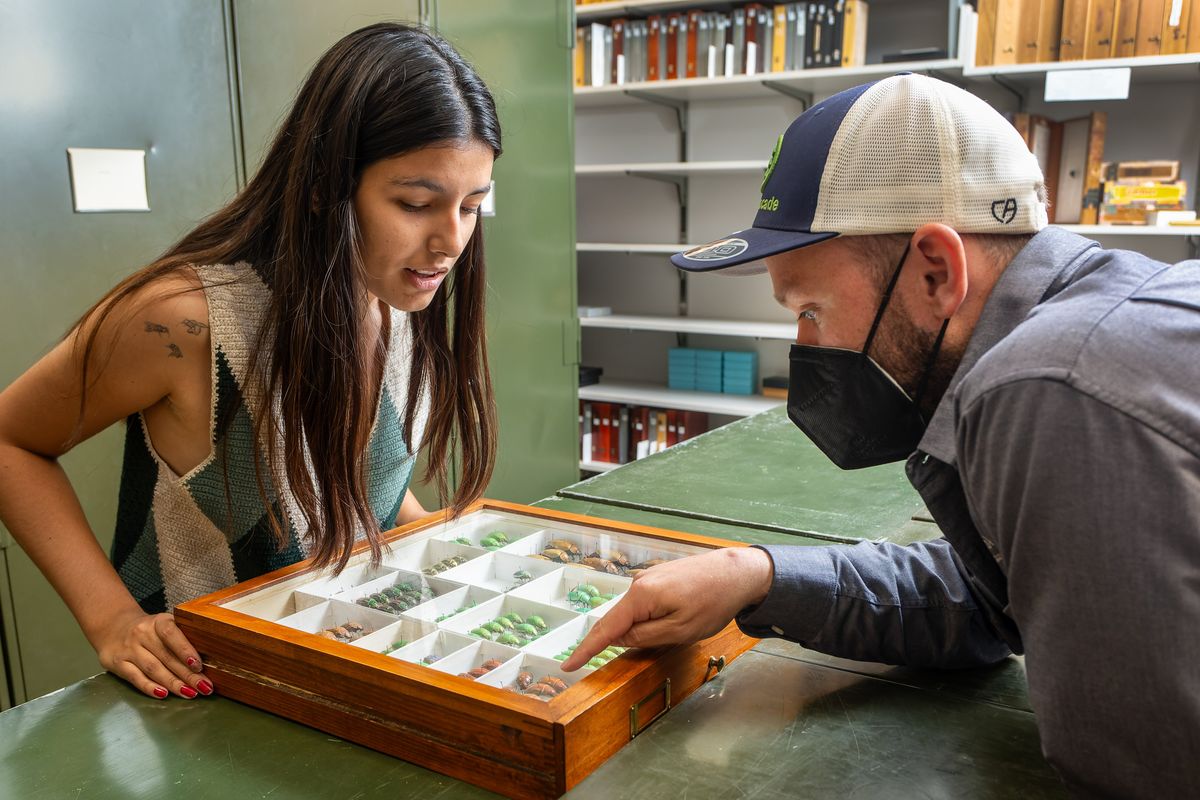Beyond bees: Guatemalan entomology student turns to WSU for learning and help

Many entomologists share similar stories of collecting bugs in their youth, but new Washington State University master’s student Ana Cristina Garcia Cordon from Guatemala takes the sentiment to the next level.
“One of my first memories of that is just going out on the street – just like right outside my house with my sister – grabbing plastic bags and just (collecting) all the ants,” Garcia Cordon, 24, said. “And we would take those bags full with ants to my grandma and she would cook them and we would eat them with tortillas and everything. So that’s one of my best memories.”
The ant Garcia Cordon described is a species of large leafcutter ant that flies for only a few days a year in Guatemala. The insects make for a popular snack when cooked with salt and lime: Zompopos de Mayo. The memory is one of many that led to her love of invertebrates.
“I realized, throughout the years, insects have always been there. And I have good memories of insects being a really important part of my family and myself and everything,” Garcia Cordon said. “So, I mean, it was just like a complete story.”
After receiving her undergraduate degree in biology from the Universidad del Valle de Guatemala, however, there weren’t any pathways there for continued education in entomology.
“There wasn’t any option for me to stay there and study entomology specifically because there’s no one there to teach me and they don’t have that opportunity as a master’s degree,” Garcia Cordon said. “So I chose Pullman specifically because I already knew (two WSU entomologists), and they agreed that if I came here I would do my master’s thesis in Guatemalan bees.”
What started nearly 20 years ago as a trip to just “go down and do some collecting and stuff and have some fun” has led to WSU maintaining one of the largest Guatemalan insect collections in the world, boasting nearly a quarter of a million specimens, WSU entomologist Richard Zack said. It has also led to lasting relationships between faculty at WSU and UVG.
“They work on projects that we are interested in, but we have started to work more and more on projects that they’re interested in,” Zack said. “Right now, they have a big biological diversity project funded by the United States Aid to International Development that they’re working on that actually we’re going to be a big part of.”
Having student exchanges between the two universities is the logical next step, to Zack. Nearing retirement, he hopes that sending students back to Guatemala with proper training will help to continue the entomological work in the country.
“Cristina is the first that is kind of a part of this next generation of trying to train students from Guatemala, and our hope is that we’ll also be able to convince some of our students to either go down there and do projects – or at least partially get involved in projects,” Zack said. “The whole point of all this is to add to our understanding of the insect fauna of Guatemala.”
Returning to Guatemala with her advanced education is exactly what Garcia Cordon plans to do. As an undergraduate, she worked to gather information on lesser known species of orchid bees in her country.
“A few years ago, no one knew about orchid bees and there was very (little) research done in orchid bees in Guatemala. But now, they’re being used in conservation projects. So that’s a really big step,” Garcia Cordon said.
Though the specifics of the research she will do while at WSU is still up in the air, it will certainly involve Guatemalan bees.
“I care because there’s no one else,” Garcia Cordon said. “I mean, there’s very few people in Guatemala doing it, and if no one is doing it, then there’s no way we can implement some conservation strategies, and the bees are going to start going extinct.”
It was Garcia Cordon’s passion for her work that led to Zack and fellow WSU entomologist Silas Bossert to approach her about continuing her education at WSU.
“As we got to know her, we’re thinking, OK, here is an exceptional young person that we should really try to get up to Washington State University,” Zack said.
Just being able to provide students with international opportunities is another goal of the collaboration between the universities. Zack hopes that if the relationship can be formalized via a memoranda of understanding, then the travel opportunity would open up to students in other departments as well.
Though he acknowledged that all of his grand ideas for a partnership between the two universities will likely not come to fruition any time soon, Zack holds that there is a lot to gain from collaboration.
“Everybody doesn’t have the goal of saving little flies in Guatemala. That’s great, that can be somebody’s goal. But that’s not going to be everybody’s goal,” Zack said. “A funder of a lot of this type of work … is the World Bank. Their whole thing is not to save little flies, it’s to encourage economic development. So now we’re really getting at the high levels, but yes, this could be a part of those types of projects.”
Garcia Cordon is more on the level of “saving little flies in Guatemala,” wanting to bring people’s attention to the bees beyond the black and yellow ones.
“I want to do that to teach people that there’s more than one bee,” Garcia Cordon said. “And for all bees to be included in these conservation projects that are really big and really important.”